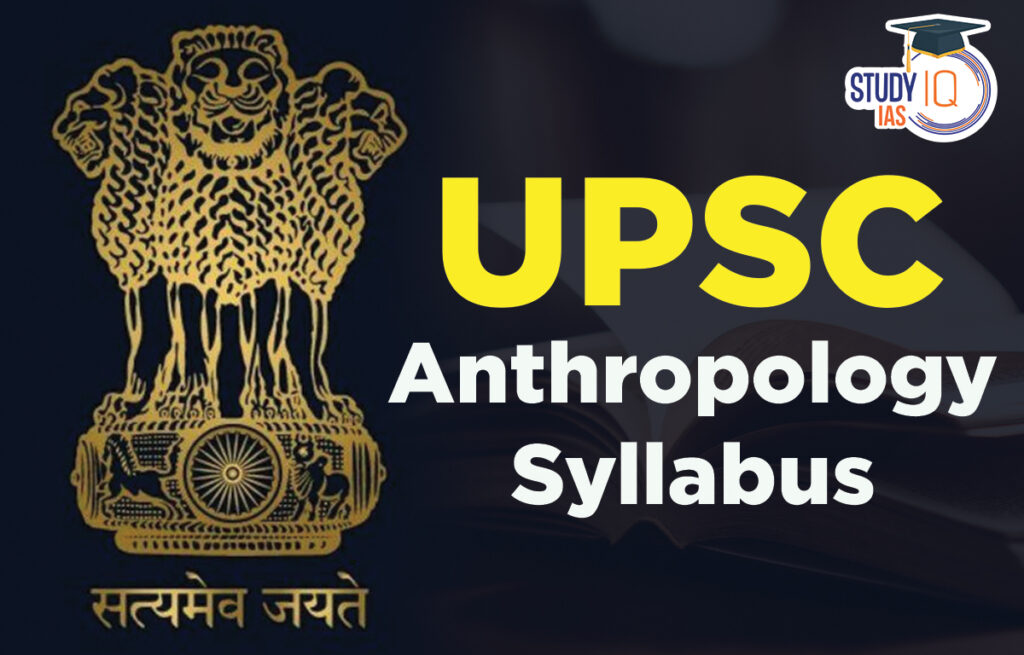
In recent years, those aspiring to the UPSC CSE exam and preparing for the UPSC IAS Mains Exam have made Anthropology one of their favourite UPSC optional subjects. Its popularity can be attributed to the availability of materials and easy understanding for studying for UPSC exams.
UPSC Anthropology Syllabus 2025
The UPSC Anthropology syllabus for 2025 covers topics in biological and cultural anthropology, archaeology, human genetics, economic systems, applied anthropology, and research methods. The optional syllabus focuses on human culture and society. The UPSC Mains Syllabus 2025 for Optional Paper II emphasizes the various aspects of Indian Society and Tribes, including the diversity of the tribes and the challenges they are facing.
UPSC Anthropology Paper 1 Syllabus 2025
The UPSC Syllabus 2025 for Anthropology optional subject Paper 1 is indeed divided into 12 parts, each covering specific topics. The Anthropology syllabus for UPSC encompasses the following areas:
| Anthropology Syllabus for Paper 1 | |
| Topic | Details |
| 1) Meaning, Scope, and Development of Anthropology | Study of human beings and their societies from a holistic perspective. |
| 1.1) Relationships with Other Disciplines | Interdisciplinary connections with sociology, psychology, biology, history, and linguistics. |
| 1.2) Main Branches of Anthropology and Their Scope | Physical Anthropology, Archaeological Anthropology, and Social/Cultural Anthropology. |
| 1.3) Human Evolution and the Emergence of Man | Study of human evolution, hominid fossils, and the emergence of modern humans. |
| 1.4) The Biological Basis of Life | Examination of genetics, human growth and development, and the biological aspects of human life. |
| 1.5) Principles of Prehistoric Archaeology | Study of archaeological investigation, principles, and chronology of prehistoric cultures. |
| 1.6) Cultural Evolution | Analysis of cultural changes and transformations across time and societies. |
| 2) Nature of Culture, Society, Marriage, Family, and Kinship | Exploration of culture, society, marriage, family, kinship, and their variations in different cultures. |
| 3) Economic Organization | Study of economic systems, modes of production, exchange, and consumption in societies. |
| 4) Political Organization and Social Control | Analysis of political systems, governance structures, power relations, and mechanisms of social control. |
| 5) Religion | Examination of religious beliefs, practices, rituals, and their cultural significance. |
| 6) Anthropological Theories | Study of various theoretical perspectives used in anthropology, including evolutionism and functionalism. |
| 7) Culture, Language, and Communication | Exploration of the relationship between culture, language, and patterns of communication. |
| 8) Research Methods in Anthropology | Utilization of methods such as participant observation, interviews, surveys, and data analysis. |
| 9) Human Genetics | Study of genetics and its application to understanding human variation and genetic diseases. |
| 10) Concept of Human Growth and Development | Examination of the processes and factors influencing human growth and development. |
| 11) Relevance of Menarche, Menopause, and Other Bioevents | Study of the implications of menarche, menopause, and biological milestones for fertility patterns and differentials. |
| 12) Applications of Anthropology | Practical applications of anthropological insights in fields such as development, public health, and policy-making. |
Candidate Solve the UPSC Previous Year Question Paper Here!
UPSC Anthropology Paper 2 Syllabus 2025
The UPSC Anthropology Optional Syllabus for Paper 2 consists of 9 units, which are as follows:
| UPSC Anthropology Syllabus 2025 for Paper 2 | |
| Evolution of the Indian Culture and Civilization |
|
| Palaeo | Anthropological evidence from India with special reference to Siwaliks and Narmada basin (Ramapithecus, Sivapithecus, and Narmada Man). |
| Ethno-archaeology in India |
|
| Demographic Profile of India |
|
| The structure and nature of the traditional Indian social system |
|
| Caste system in India |
|
| Sacred Complex and Nature |
|
|
Emergence and growth of anthropology in India-Contributions of the 18th, 19th, and early 20th Century scholar-administrators. Contributions of Indian anthropologists to tribal and caste studies. |
|
| Indian Village: |
|
| Linguistic and religious minorities and their social, political, and economic status. | |
| Indigenous and exogenous processes of socio-cultural change in Indian society: Sanskritization, Westernization, Modernization; |
|
| The Tribal situation in India | Bio-genetic variability, linguistic and socio-economic characteristics of tribal populations and their distribution. |
| Problems of the tribal Communities | land alienation, poverty, indebtedness, low literacy, poor educational facilities, unemployment, underemployment, health, and nutrition. |
| Developmental Projects and their impact on tribal displacement |
|
| Problems of Exploitation and Deprivation of Scheduled Castes, Scheduled Tribes, and Other Backward Classes. | Constitutional safeguards for Scheduled Tribes and Scheduled Castes. |
| Social Change and contemporary tribal societies | Impact of modern democratic institutions, development programs, and welfare measures on tribals and weaker sections. |
|
The concept of ethnicity |
|
| Impact of Hinduism, Buddhism, Christianity, Islam, and other religions on tribal societies. | |
| Tribe and nation-state – a comparative study of tribal communities in India and other countries. | |
| History of administration of tribal areas, tribal policies, plans, programs of tribal development, and their implementation. | The concept of PTGs (Primitive Tribal Groups), their distribution, and special programs for their development. Role of N.G.O.s in tribal development. |
| Role of anthropology in tribal and rural development. | |
| Contributions of anthropology to the understanding of regionalism, communalism, and ethnic and political movements. | |


























